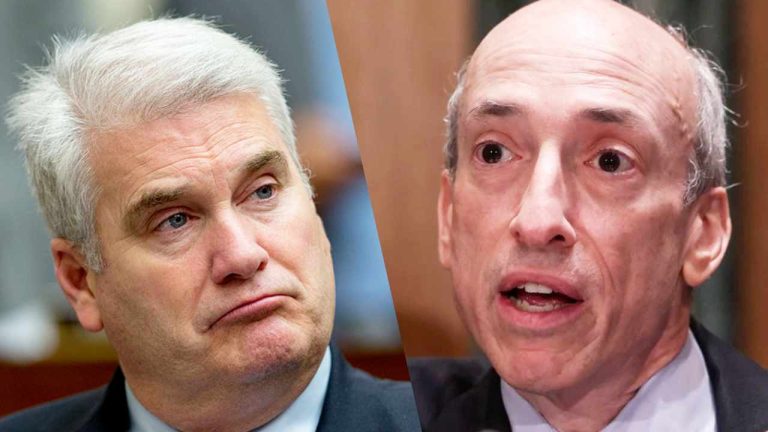
Binance is unveiling a new “megadrop” token launch platform with Bitcoin (BTC) “restaking” chain BounceBit (BB) as its first project. In a new announcement, the world’s largest crypto exchange platform by volume says that the Binance Megadrop is a new platform that integrates both Binance Simple Earn and Binance’s Web3 Wallet and will grant investors […]
The post Binance Unveils New ‘Megadrop’ Token Launch Platform, Picks Bitcoin Restaking Chain To Serve As First Project appeared first on The Daily Hodl.
 On Tuesday, the crypto platform Umoja unveiled its beta version of hedging-as-a-service, designed to shield users from crypto losses. Umoja’s mission is to enhance the safety and accessibility of crypto investments, opening up hedging opportunities in a market valued at $500 trillion. Umoja Debuts Beta Hedging Platform The crypto platform Umoja has announced the beta […]
On Tuesday, the crypto platform Umoja unveiled its beta version of hedging-as-a-service, designed to shield users from crypto losses. Umoja’s mission is to enhance the safety and accessibility of crypto investments, opening up hedging opportunities in a market valued at $500 trillion. Umoja Debuts Beta Hedging Platform The crypto platform Umoja has announced the beta […]
Binance CEO Changpeng Zhao emphasizes the need for a proper understanding of the crypto industry by regulators and active engagement by industry players to achieve regulatory clarity.
In a fireside chat during the Hong Kong Web3 Festival, Changpeng Zhao (CZ), CEO of Binance, expressed that it is important for crypto regulators to have a deep understanding of the industry to facilitate proper crypto regulations. The fireside chat was moderated by Deng Chao, the CEO of Hashkey Capital.
According to CZ, “There is a very natural tendency to borrow traditional financial industry regulations to apply to crypto. Crypto is different from banks and traditional financial industries” He went on to explain that knowing the answers to simple questions like how to classify different assets is important in deciding on regulations for the industry, as there are many types of crypto assets. Some assets may look like securities, others like commodities, or utility tokens, some may even have a combination of those characteristics.
When asked his recommendation on good regulation framework, CZ said that having unclear regulations is “the worst” and having regulatory clarity is better. He went on to say that it’s best to let the industry develop fully before introducing regulations. The particular reason for this is that it’s difficult to predict what exactly is going to be popular in the industry.
In relation to crypto industry players and their approach towards crypto regulators, CZ advised that there is a need to be very actively engaged with them. He explained that though many of the crypto regulators all around the world are very receptive, there are some who are still very skeptical. However, skepticism should deter crypto industry players from engaging the regulators in conversations.
Related: US needs to regulate stablecoins to keep a strong dollar: Stellar CEO
Responding to what could trigger mass adoption of crypto, CZ said that the fact that many governments are trying to come for crypto may actually be the trigger to make crypto grow. He explained that the government's efforts in shutting down banks, fiat access and putting more restrictions on the traditional financial markets actually push more people towards crypto.
CZ stressed the need for crypto industry players to exercise patience. He said that understanding that the first draft of regulations is always likely overly restrictive is important and so in just a matter of time, a balance is usually found.
Hong Kong supporting web3 recently showed support for Web3 by taking major steps to develop the Web3 industry.
Magazine: Thailand’s $1B crypto sacrifice, Mt Gox final deadline, Tencent NFT app nixed

Regulatory considerations are front and center as a panel of cryptocurrency industry insiders unpacks the current state of CeFi and DeFi in Paris.
Centralized finance (CeFi) will continue to be an important avenue to drive the adoption of decentralized finance (DeFi) services in the future, but regulatory considerations remain a significant part of the process.
This was a key theme that emerged during a panel titled ‘How to Do CeFi Right - the Balance Between TradFi & DeFi?’ at Paris Blockchain Week. A handful of industry experts weighed in on the current state of CeFi and DeFi, their relationship and importance for the future of the space.
Eric Turner, vice president of market intelligence at Messari, highlighted the core difference between the two terms, which have become somewhat overlapping in recent years given the link between centralized exchanges and decentralized platforms:
“When you think about what we consider CeFi today, it’s the centralized exchanges. It’s people that are offering custody services and lending services. But if it's between DeFi and CeFi, you know, all of those services can be built in different ways.”
Turner also highlighted CeFi’s role as the main onramp for the ‘next billion users’ in terms of a fiat entry mechanism as well as a trusted avenue for larger professional investors to move into the crypto space.

Joaquin Sastre, BitGo’s LatAm & EMEA managing director, said that the institutional-focused wallet platform sees a key difference between the two categories:
“What really matters here, to differentiate between CeFi and DeFi from our view, is really the access and the storage.”
Sastre maintains that adoption of DeFi protocols and platforms will be a natural progression, while CeFi continues to give regulators a means to offer some protection institutions through controls and legal parameters.
Related: 1inch Network co-founder to crypto newbies: ‘Don’t trust anyone, verify’ | PBW 2023
Ian McAfee, co-founder and CEO of Shift Markets, highlighted the importance of what CeFi platforms and DeFi protocols have to offer while suggesting the terminology itself serves more to describe and capture what the technology could do:
“Finance will just be using blockchain 20 years from now, right? So these words are just kind of going to evaporate.”
Charlie Meraud, CEO of cryptocurrency market maker Woorton, believes that the two are becoming intrinsically linked, moving on from the original drawcards of DeFi which offered interest rates on liquidity pools that were better than anywhere else:
“We’re going to end up in a world where you take a credit risk with TradFi, or a technology risk with DeFi. You're going to have to trade off between those two and make those two live in the same world.”
CeFi also remains a key driver for cryptocurrency adoption according to McAfee, who said that centralized institutions are still ‘waking up to crypto’ as an asset class. Helping banks and brokers largely involves introducing them to CeFi services like centralized exchanges:
“You give it to them in a format that they're familiar with. The first thing people do is to buy Bitcoin or the first thing that gives a taste of this new technology.”
Sastre also believes that tokenization of assets is another major driver of adoption which is served by both CeFi and DeFi players. He said that tokenization of financial assets and real estate are ‘no-brainers’ that will be driven by wider use of CeFi in particular:
“It gives you access to the asset to be able to be traded worldwide 24/7. That is a huge advantage for financial markets and also for normal people in the street.”
While CeFi continues to plug into DeFi protocols to serve both retail and institutional users, regulation remains one of the most important considerations for organizations and businesses looking to enter the cryptocurrency ecosystem through some sort of exposure.
For BitGo’s Sastre, regulation is an inevitable component that is necessary given the fallout of the collapse of core CeFi players like FTX over the past year:
“These things can be avoided if there's a segregation of duties, if there's qualified, regulated fiduciary custodians holding the assets and giving the proven truth of reserves.”
Turner also stressed the importance of the cryptocurrency industry taking a more active role in driving conversations with regulators and government agencies to help the not-so crypto savvy have a better understanding of the ins and outs of the ecosystem:
“If we can regulate where the on ramps and the off ramps are, I think that's incredibly powerful to allow us to build everything else in this industry.”
The regulation was a particularly hot topic given that American cryptocurrency exchange Coinbase received a Wells Notice from the U.S. SEC in relation to its staking services on March 22. This is a prime example of a CeFi player offering DeFi-based services to its users.
Cointelegraph is on the ground at Paris Blockchain Week - providing live updates from key presentations, panels and interviews throughout the event.

A Binance spokesperson told Cointelegraph that they hired 600 people since January and have no imminent plans for layoffs.
Cryptocurrency exchange Binance is “not planning any layoffs” and is instead trying to fill another 500 roles by the end of June, according to a Binance spokesperson.
The comments came despite a huge spike in crypto layoffs in January — the majority of which were from crypto exchanges. In a statement, the Binance representative said:
“As of today, we are actively hiring for more than 500 roles with the goal of filling them by the end of H1 [...] We are not planning any layoffs.”
The spokesperson was responding to a request for clarification from Cointelegraph on March 1 regarding a tip it had received of possible redundancies at the crypto exchange. The latest comments appear to completely refute this speculation.
At the time of writing, Binance had 463 listings on its job openings page, with roles in business development, communications, customer support and engineering, to name a few.

In January, Binance CEO Changpeng Zhao said that the firm was planning for a hiring spree in 2023, increasing its headcount by 15% to 30%, according to a Jan. 11 report from CNBC.
The spokesperson said that the company has hired more than 600 people since the start of 2023.
According to CoinGecko, 84.8% of the crypto layoffs in January were due to crypto exchanges reducing headcount, including Coinbase, Huobi, Blockchain.com, Crypto.com and Luno.
Coinbase announced it would be reducing its headcount by around 950 on Jan. 10, while Crypto.com announced on Jan. 13 that it would be reducing its workforce by around 500.
Related: Sen. Elizabeth Warren and colleagues demand to see Binance’s balance sheets
Binance has been regarded by some, such as Arcane, as one of the “winners” of 2022, with the fall of crypto exchange FTX and the implementation of zero-fee Bitcoin (BTC) trading leading to it capturing an overwhelming portion of the market.
On the other side of the coin, the exchange has also seen intense scrutiny. Most recently, this has revolved around the alleged shuffling of $1.8 billion in funds which some have compared to the actions of bankrupt crypto exchange FTX.
Binance used $1.8 billion in customer funds for its own purposes, similar to what FTX did
— Genevieve Roch-Decter, CFA (@GRDecter) February 28, 2023
Here we go again
Binance CEO Changpeng Zhao took to Twitter to respond to the allegations, labeling it “FUD” and suggesting it was standard practice for an exchange.
This year has had a tough start for those working in the crypto industry, with at least 14 firms and nearly 3,000 jobs being lost in January before a milder 570 layoffs in February.
But the tide could be turning, with the crypto market cap increasing by over 34% so far in 2023, according to CoinMarketCap, and other firms, such as USDC issuer Circle, also planning to go on a hiring spree.

Some crypto tokens will perform better than stocks in 2023 as they become less sensitive to macroeconomic factors, according to CIO at Arca Jeff Dorman.
Digital assets will largely decouple from traditional equity markets in 2023, says Chief Investment Officer at Arca, Jeff Dorman.
Discussing his outlook for 2023 in a recent interview with Cointelegraph, Dorman argues that as the global economy enters a recession this year, equities will be negatively affected while some crypto tokens will perform well: the value of the latter, he explained, is determined not only by macroeconomic factors but also by their utility within the respective ecosystems, which would remain unaltered in a recession.
“You're going to see a lot of stocks get punished under the weight of restructurings and under the weight of lower revenues and lower cash flows. And you're actually going to see a lot of tokens do really well”, Dorman explained.
Crypto's decoupling process from equities may not involve Bitcoin though, which according to Dorman, will remain highly correlated to the stock markets, given its high sensitivity to macro factors such as global liquidity and interest rates.
“Bitcoin has just become a 24-seven VIX, it's just a trading vehicle now for large funds who want to get in and out of risk on weekends and overnight trading hours”, Dorman pointed out.
To find out more about Dorman’s crypto predictions for 2023, check out the full interview on our YouTube channel, and don’t forget to subscribe!

A seasoned crypto hedge fund with $4.5 billion worth of assets under its management is asserting the superiority of decentralized finance (DeFi) ecosystems. In a new letter penned by CEO Dan Morehead and other executives, crypto hedge fund Pantera Capital says that the DeFi sector is head and shoulders above centralized finance (CeFi) due to […]
The post Veteran $4,500,000,000 Crypto Hedge Fund Says ‘DeFi Is Superior’ – Here’s Why appeared first on The Daily Hodl.

Bitcoin proponent and author Jeff Booth is convinced that the crypto ecosystem will eventually collapse as a consequence of its centralization — except Bitcoin, that is.
The downfall of FTX and a number of other CeFi platforms in 2022 has reinforced a Bitcoin maximalist narrative, according to which most of the crypto ecosystem will eventually collapse due to its centralization.
Jeff Booth, Bitcoin proponent and author of "The Price of Tomorrow", believes centralized crypto platforms such as FTX and Celsius have ended up replicating the traditional financial system with all its inherent flaws.
"All of crypto is trying to rebuild a financial system that we already have based on manipulation and centralization," said Booth, in an exclusive interview with Cointelegraph.
Even Defi platforms, which seek to provide a peer-to-peer, trustless alternative to traditional financial services, are bound to fail, according to Booth, since they are being built on protocols that have sacrificed decentralization and security in order to boost scalability.
To Booth, Bitcoin is the only crypto that remains decentralized and secure enough for being the base layer of the future financial system.
"The entire crypto ecosystem is going to go to zero besides Bitcoin", Booth said.
To find out more about why Bitcoin may outlive the rest of the crypto ecosystem, check out the full interview on our YouTube channel, and don’t forget to subscribe!
 U.S. Congressman Tom Emmer says the FTX meltdown is not a crypto failure but a failure with SEC Chairman Gary Gensler, former FTX CEO Sam Bankman-Fried, and centralized finance. “We need to get to the bottom of this. We need to understand why Gary Gensler and the SEC were not doing their job,” the lawmaker […]
U.S. Congressman Tom Emmer says the FTX meltdown is not a crypto failure but a failure with SEC Chairman Gary Gensler, former FTX CEO Sam Bankman-Fried, and centralized finance. “We need to get to the bottom of this. We need to understand why Gary Gensler and the SEC were not doing their job,” the lawmaker […]
DeFi crypto lending has operated as intended through the crypto winter because transparency kept it in line and business activities were siloed, according to Maple Finance’s Sid Powell.
Maple Finance co-founder and CEO Sid Powell says that transparency has been the saving grace of decentralized finance (DeFi) amid the prolonged crypto market slump.
Speaking to Cointelegraph on the sidelines of Converge22 conference in San Francisco, Powell noted that throughout the crypto winter, DeFi has continued to operate as intended while centralized finance (CeFi) has become “pretty inactive.”
Powell suggested that during the market crash, CeFi lenders hadn't properly "battle-tested" and weren’t “prepared to liquidate clients," wanting to maintain client relationships.
“As the price of Bitcoin was tumbling, they didn’t want to be sending out margin call letters or email hundreds of clients because they wanted to maintain client relationships,” Powell explained.
“So you give them a little bit longer, a little bit longer — well, suddenly a lot of these loans are underwater, particularly the ones that started on or [were] undercollateralized.”
He notes that where CeFi firms are still lending, “they’re doing so on a 1:1 collateralization.”
On the other hand, “DeFi is much more transparent,” he explained. In overcollateralized DeFi models, “people just got liquidated as BTC and ETH dropped. That happened automatically.”
“In DeFi you can’t get away with letting one borrower be half of a lending pool because people see that and they question the risk management there.”
“All of the loans are visible, so you had to be much more careful of who you underwrote and how you underwrote them,” Powell said.
Powell also added that CeFi businesses were diversified with trading and prime brokerage, which they thought was a strength, but all of their business lines impacted each other:
“But if a CeFi lender ran a pool on Maple, that pool would not be affected by what is happening in the trading part of that business [...] It’s restricted and siloed to just the lending activity.”
Related: Decentralized finance faces multiple barriers to mainstream adoption
Maple is a decentralized finance credit platform that claims to hold 50% of the institutional crypto lending market as measured by total loans outstanding and has issued close to $1.8 billion worth of loans since its inception in May 2021.
The Maple loan book “seriously outperformed CeFi,” Powell said, “with only one $10 million default on $1.8 billion of loans originated and 900 [loans] outstanding at the time.”
Powell described Maple Finance as “a venue for people to run lending pools,” but said there has been a reduced appetite to lend since June, causing prices for lending to go up from 8-9% to 10-13%, and thus crypto whales and yield aggregators have started to allocate again to lending platforms like Maple.